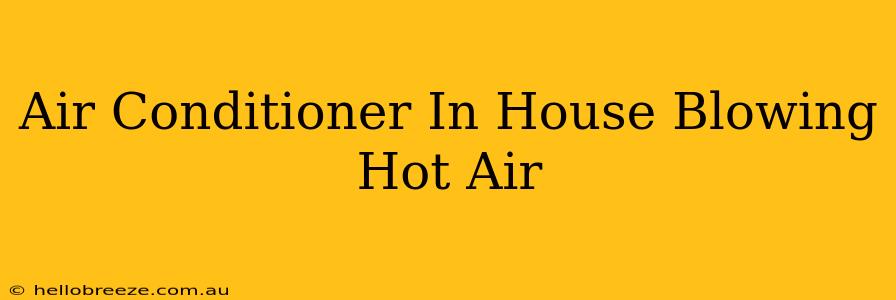Is your air conditioner suddenly blowing hot air instead of the cool relief you crave? Don't panic! This is a common problem with several possible causes, many of which you might be able to troubleshoot yourself. This guide will walk you through the most common reasons why your AC is blowing hot air and how to fix them.
Why is My AC Blowing Hot Air?
Several factors can cause your air conditioner to blow hot air. Let's explore the most frequent culprits:
1. Refrigerant Leaks: The Most Common Culprit
This is often the most significant reason for a malfunctioning AC. Refrigerant is the crucial component responsible for cooling the air. A leak means your system lacks the necessary cooling agent. Identifying a refrigerant leak requires professional assistance. You'll need an HVAC technician to locate and repair the leak and recharge the system with the correct amount of refrigerant. Never attempt to handle refrigerant yourself; it's dangerous.
2. Dirty Air Filter: A Simple Fix
A clogged air filter restricts airflow, hindering your AC's ability to cool properly. This is an easy fix! Regularly check and clean or replace your air filter. A clean filter allows for optimal airflow and improves the efficiency of your system. Consult your AC's manual for the recommended frequency of filter changes; usually, it's every 1-3 months.
3. Frozen Evaporator Coil: Ice, Ice, Baby (Not Good!)
A frozen evaporator coil is another common problem, often stemming from a restricted airflow due to a dirty filter or frozen drain line. The ice restricts airflow, preventing your AC from cooling effectively. Turn off your AC to allow the ice to melt. Once melted, thoroughly clean or replace the air filter and check the drain line for clogs. If the problem persists, professional help may be needed.
4. Capacitor Issues: The Electrical Heart of Your AC
The capacitor is an electrical component that helps the compressor start. A faulty capacitor can prevent the compressor from running properly, resulting in hot air blowing from your vents. This is a job for a professional HVAC technician. They have the expertise and tools to diagnose and replace the capacitor safely.
5. Compressor Problems: The Powerhouse of Cooling
The compressor is the heart of your AC system. If it fails, your AC will not cool effectively. A failing compressor often produces unusual noises, like loud clanging or humming. A failing compressor requires professional attention. Repair or replacement is usually a costly undertaking.
6. Electrical Problems: Check the Power Supply
Ensure your air conditioner is properly connected to a power source and that the circuit breaker hasn't tripped. A tripped breaker or loose wiring can cut off power to your unit.
7. Thermostat Troubles: The Control Center
A malfunctioning thermostat can prevent your AC from functioning correctly. Check the thermostat's batteries and ensure it's set to the correct cooling mode. If the problem continues, you may need to replace the thermostat.
When to Call an HVAC Technician
While some minor issues can be addressed with simple maintenance like filter cleaning, more complex problems such as refrigerant leaks, compressor failure, or electrical issues require the expertise of a qualified HVAC technician. Don't hesitate to call a professional if:
- You suspect a refrigerant leak.
- The problem persists after basic troubleshooting.
- You hear unusual noises from your AC unit.
- You're uncomfortable handling electrical components.
Preventing future problems: Regular maintenance, including filter changes and annual inspections, can significantly prolong the lifespan of your AC unit and prevent costly repairs. Remember, a well-maintained AC is a cool AC!

